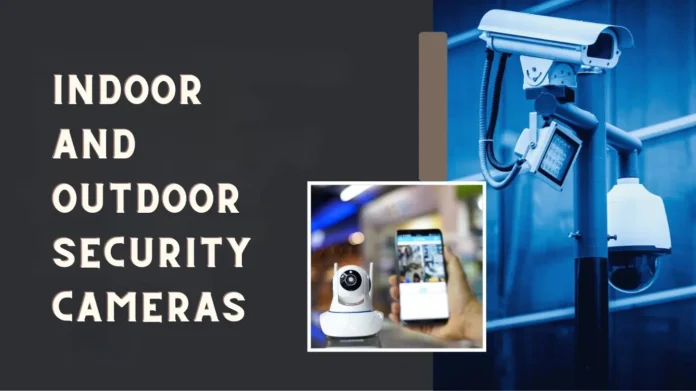With all the choices out there, it can be difficult to know which cameras best suit your needs. One of the first things to understand is the idifference between indoor and outdoor cameras. Making the right choice can be overwhelming as camera know-how and knowledge are not common to all.
This article will help you with that. You don’t have to worry because you simply need to know the main differences between indoor cameras and outdoor cameras. After reading this blog post, you’ll have the essential information necessary when it comes to choosing and evaluating indoor and outdoor cameras.
Understanding the Basics of Security Cameras
When considering the safety of your family and property, security camera systems can add an extra level of comfort. With all the choices out there, it can be difficult to know which cameras best suit your needs. One of the first things to understand is the difference between indoor and outdoor cameras.
The primary difference between indoor and outdoor security cameras is the types of external factors each camera has to be able to withstand. While both types of cameras usually come in similar styles and with comparable features, outdoor cameras need to be able to contend with all types of weather and varying light conditions.
Factors to consider when installing a security camera
When comparing an outdoor camera with an indoor camera, you should consider your needs as well as what kind of surroundings you will be filming in.
Design
The design of indoor and outdoor CCTV cameras is different. Indoor cameras are usually smaller in size and more sleek in appearance. They are designed to blend in with the surroundings and not draw attention to themselves. They are also designed to be mounted on walls or ceilings.
On the other hand, outdoor cameras are usually larger and more robust in design. They are designed to withstand harsh weather conditions such as rain, wind, and extreme temperatures. They are also designed to be mounted on walls or poles.
Durability
Indoor cameras are not designed to withstand harsh weather conditions or extreme temperatures. They are designed to be used in a controlled environment where there is no risk of damage due to weather or temperature.
Outdoor cameras, on the other hand, are designed to withstand harsh weather conditions and extreme temperatures. They are built with materials that can withstand rain, wind, and extreme temperatures. They are also designed to be waterproof and dustproof.
Privacy
Outdoor security cameras record outdoor activity without recording more private moments inside your home. If your main concern is deterring and recording intruders, an outdoor system should suffice.
However, if you have a babysitter, cleaning crew, or pets or teenagers you want to keep an eye on, indoor security cameras allow you to monitor activity within your home from your computer or smartphone for complete peace of mind.
Image Quality
Indoor cameras are designed to provide high-quality images in low-light conditions. They are usually equipped with infrared technology that allows them to capture clear images even in complete darkness. They are also designed to provide a wider field of view.
Outdoor cameras, on the other hand, are designed to provide high-quality images in bright light conditions. They are usually equipped with technology that allows them to adjust to changes in lighting conditions. They are also designed to provide a narrower field of view.
Power Supply
Indoor cameras are usually powered by electricity. They are designed to be connected to a power outlet or a power source that is located nearby. They do not require a backup power supply.
Outdoor cameras, on the other hand, are usually powered by electricity or batteries. They are designed to be connected to a power source or a battery that can provide backup power in case of a power outage.
Installation
Indoor cameras are usually easy to install. They can be mounted on walls or ceilings using screws or adhesive tape. They do not require any special tools or equipment.
Outdoor cameras, on the other hand, are more difficult to install. They require special tools and equipment to mount them on walls or poles. They also require a power source and a network connection to be set up.
Cost
Indoor cameras are usually less expensive than outdoor cameras. They are designed for use in a controlled environment and do not require the same level of durability and weather resistance as outdoor cameras.
Outdoor cameras, on the other hand, are more expensive than indoor cameras. They are designed to withstand harsh weather conditions and extreme temperatures and require more durable materials and technology.
Night Vision
Most of the outdoor cameras are equipped with night vision features to let you visualize your residence in the dark. Outdoor cameras employ infrared LEDs to enhance night vision capabilities. The infrared LEDs in outdoor cameras can have a more extended range, allowing them to capture clear images at greater distances. With smart infrared technology, outdoor cameras can adjust the intensity of the infrared illumination based on the proximity of objects to the camera.
Indoor security cameras can include night vision and typically feature less robust infrared LEDs. Since they are designed for shorter distances and smaller indoor spaces, the illumination range requirements are decreased. Indoor night vision features are mainly sufficient for viewing your home in the dark at a close distance.
Benefits of Indoor and Outdoor Security Cameras
Conclusion
Are you looking to install security cameras in Canada? Spotter Security offers security camera installation, maintenance, and monitoring to keep your business secure. Whether you’re looking for indoor or outdoor cameras you can always trust us.
With over 20 years of experience in the security industry and expertise in securing businesses from multiple industries including manufacturing, retail, warehousing, and office complexes, Spotter Security makes sure to get the best system for your security.
Book a consultation to start talking about how your business can be better secured to protect your assets and personnel.



































